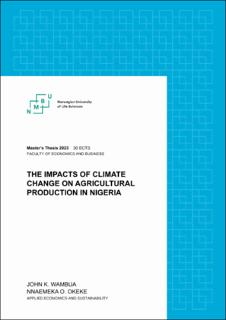The Impacts of Climate Change on Agricultural production In Nigeria.
Master thesis
Permanent lenke
https://hdl.handle.net/11250/3097629Utgivelsesdato
2023Metadata
Vis full innførselSamlinger
- Master's theses (HH) [1072]
Sammendrag
Climate change is a global phenomenon that affects agricultural activities. However, the study of the implications of climate change agricultural production and productivity is yet to receive needed attention. On this premise, and with a focus on Nigeria, this study examined the impacts of climate change on agricultural production and productivity using the last Nigeria General Households Survey (NGHS) 2018/2019. The specific objectives were to determine the impact of climate change on both crop and livestock production as well as productivity.. The data was analysed using the Ordinary Least Squares (OLS) estimation technique. The results revealed that climate variability significantly influences crop and livestock production and productivity. Increasing rainfall negatively impacts livestock income, milk and egg production whereas, less exposure to normal rainfall reduces crop production. Specifically, drought shock negatively affects crop production with a magnitude negative impact of about 35%, and heat stress results show a higher negative impact on crop production by 56%. However, the study found no significant negative result for livestock production.. Surprisingly, heat stress increases livestock sales by 63% at 5% significance level, and the mean of annual maximum temperature increases milk production by 6%. The study, therefore, recommends that the policy makers should establish a national strategy to encourage adaptation measures because the current trend of rising temperatures and variations in precipitation is unavoidable and are likely to be magnified in the future. Scaling up these adaptive benefits also necessitates government investment to promote awareness and give technological assistance.
